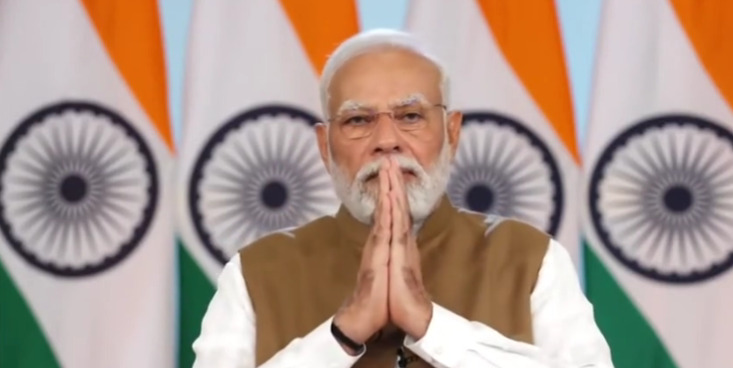Prime Minister addressed the G20 Culture Ministers’ Meeting held in Varanasi, Uttar Pradesh
The Prime Minister of India, Shri Narendra Modi, spoke via video link today at the G20 Culture Ministers' Meeting in Varanasi, Uttar Pradesh.
The G20 Culture Ministers' Meeting is being held in Varanasi, popularly known as Kashi, which the prime minister invited the dignitaries to and expressed happiness about because it is his parliamentary district. The Prime Minister cited the nearby village of Sarnath, where Lord Buddha gave his first sermon, while referring to Kashi as one of the oldest continuously inhabited cities. The Prime Minister said, "Kashi is known to be a treasure chest of knowledge, duty, and truth and it is indeed the cultural and spiritual capital of India." He advised the guests to attend the Ganga Aarti ceremony, travel to Sarnath, and sample some of the local cuisine.
The Prime Minister emphasised that culture has the intrinsic ability to bring people together and help us understand people from different backgrounds and viewpoints, adding that the work of the G20 Culture Ministers Group is extremely important for all of mankind. India is highly proud of its rich and enduring culture. As he emphasised that India has been working hard to protect and revitalise its heritage monuments, Shri Modi stated, "We also place tremendous value to our intangible cultural legacy. He mentioned charting the nation's cultural resources and artists both at the national and local levels. As an example, he cited the tribal museums spread around the nation that celebrate the vibrant culture of India's tribal populations. He also referenced the construction of numerous centres to honour Indian culture. The Prime Minister mentioned the Prime Ministers' Museum in New Delhi, describing it as a unique initiative to highlight India's democratic legacy. The 'Yuge Yugeen Bharat' National Museum, which when finished will be the largest museum in the world depicting India's history and culture spanning more than 5,000 years, was another topic he brought up.
Speaking on the crucial topic of cultural property restitution, the PM praised the working group's efforts and noted that tangible legacy is not just of material value but also a part of a country's history and character. According to Shri Modi, "Everyone has the right to access and enjoy their cultural heritage." Since 2014, India has brought back hundreds of such artefacts that highlight the splendour of its old civilization, according to the Prime Minister. He also praised the contributions to "Culture for LIFE" and the initiatives to preserve living history. The Prime Minister argued that cultural heritage includes more than simply the things that have been carved into stone, such as traditions, customs, and holidays that have been passed down through the years. The working group's efforts, in the opinion of the prime minister, will promote sustainable behaviours and ways of life.
The Prime Minister emphasised the importance of heritage for economic diversification and prosperity, which is echoed in India's national motto, "Vikas Bhi Virasat Bhi," which means development and heritage. The Prime Minister praised the "One District, One Product" project, which highlights the distinctiveness of Indian crafts while also promoting self-reliance, saying that India "takes pride in its 2,000-year-old craft heritage, with nearly 3,000 unique arts and crafts." He emphasised how important it is for G20 countries to support cultural and creative sectors since doing so will help inclusive economic growth as well as creativity and innovation. The PM said that India will launch the PM Vishwakarma Yojana in the upcoming month with an initial investment of 1.8 billion dollars. He claimed that it will develop a system of assistance for traditional craftspeople, allowing them to prosper in their work and help preserve India's rich cultural legacy.
The Prime Minister referenced India's National Digital District Repository, which is assisting in the rediscovery of the history of the liberation struggle, in highlighting the role that technology plays in celebrating culture. He emphasised India's use of technology to improve cultural landmark preservation and make tourist-friendly changes to important cultural sites.
The G20 Culture Ministers' working group has launched the "Culture Unites All" campaign, which captures the essence of Vasudhaiva Kutumbakam - One Earth, One Family, One Future," the Prime Minister said in his concluding remarks. He also praised them for playing a crucial part in creating a G20 Action Plan with concrete results. "Your work demonstrates the value of the four Cs: collaboration, commerce, culture, and creativity. In order to create a compassionate, inclusive, and peaceful future, it will allow us to harness the power of culture, the Prime Minister said.


